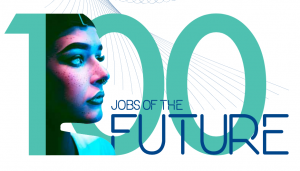Media reports and scholarly literature alike tend to emphasise the jobs that might / will disappear over the next few years under the influence of automation and artificial intelligence. Some reports suggest that as many as 50% of job roles will disappear. Others suggest that work might eventually become a thing of the past entirely, resulting in either a leisure-based utopia and universal income for humans, or the end of society, economy, and possibly even civilisation as we know it.
Over the past 5-6 years that I’ve been active in this area of research, I’ve worked to temper these claims. Yes, some roles have disappeared already (typesetter, switchboard operator, toll and parking fee collector…) It is very likely that other roles will follow behind them in the next few years (tax accountants, warehouse jobs, many types of customer service roles, telemarketers [yay!]…) Other jobs roles will continue to exist, but the tasks inside those roles will become more about (i) interacting with technology, and (ii) things that only humans can do (or things that it is too expensive for machines to do).
I’ve always wanted to know about the other side of this story: Could there be jobs that become more common? Will there be entirely new jobs created?
This is what the ‘100 jobs of the future’ research project is about.
I (at Griffith University) worked with colleagues from Deakin University (Russel Tytler and Peta White), with funding supplied by Ford Australia, to try to figure out what the ‘uniquely human’ job roles might be in the next 20-30 years, including some entirely new roles. We explicitly wanted to provide a counterpoint to the ‘Robots are Coming For Our Jobs’ narrative, and to inspire young people to think about the possibilities that they might be able to find or create for themselves.
We interviewed a range of experts in technology, science, and various social science-based fields, to figure out what the key broad trends were that might impact on the world of work over coming decades*. By overlaying these trends onto one another, we were able to construct job roles and descriptions, and an indication of the kinds of human capabilities that might be required to do them. We then built a quiz based on career theory to help young people identify future job roles that might suit them, and to get them started in developing their interests and capabilities.
It was a really fun project. The report, quiz, and supporting educational materials are available at 100jobsofthefuture.com
Here are the jobs:
• 100 year counsellor
• Forensic data analyst
• Energy and data systems installer
• Additive manufacturing engineer
• Freelance virtual clutter organiser
• Entomicrobiotech cleaners
• Aesthetician
• Fusionist
• Ethical hacker
• Aged health carer of the future
• Gamification designer
• Farm safety advisor
• Aged persons climate solutions consultant
• Genetics coach
• Flood control engineer
• Agroecological farmer
• Haptic technology designer
• Food knowledge communicator
• AI educator
• Health shaper
• Trendwatcher
• AI intellectual property negotiator
• Human habitat designer
• Virtual and augmented reality experience creator
• Algorithm interpreter
• Innovation manager
• Virtual assistant personality designer
• Analogue experience guide
• Integrated ecology restoration worker
• Virtual surgeon
• Automated transit system troubleshooter
• Integrated energy systems strategist
• Waste reclamation and upcycling specialist
• Automation anomaly analyst
• Integrated home technology brokers
• Water management specialist
• Autonomous vehicle profile designer
• Lifelong education advisor
• Weather control engineer
• Behaviour prediction analyst
• Local community co-ordinator
• Drone experience designer
• Biofilm plumber
• Machine-learning developer
• Early childhood teacher
• Bio-jacker
• Massive 3D printed building designer
• Terraforming microbiologist
• Biometric security solutions engineer
• Mechatronics engineer
• Biomimicry innovator
• Media remixer
• Bioprinting engineer
• Memory optimiser
• Blockchain talent analyst
• Multisensory experience designer
• Chief digital augmentation officer
• Nanomedical engineer
• Chief ethics officer
• Net positive architect
• Child assistant bot programmer
• New materials engineer
• Community farm finance broker
• Nostalgist
• Community support worker
• Nutri-gutome consultant
• Cricket farmer
• Offworld habitat designer
• Cross-cultural capability facilitators
• Personal brand manager & content curator
• Cyborg psychologist
• Personalised marketer
• Data commodities broker
• Predictive regulation analyst
• Data farmer
• Quantum computer programmer
• Data privacy strategist
• Real-virtual transfer shop manager
• Data storage solutions designer
• Regional community growth co-ordinator
• Data waste recycler
• Robot ethicist
• Data-based medical diagnostician
• Robot mechanic
• Decision support worker
• Satellite network maintenance engineer
• De-extinction geneticist
• Shadowtech manager
• Digital apiarist
• Sharing auditors
• Digital implant designer
• Smart dust wrangler
• Digital memorialists and archivists
• Space tourism operator
• DigiTech troubleshooter
• Sportsperson of the future
• Displaced persons re-integrator
• Sustainable energy solutions engineer
• Drone airspace regulator
• Swarm artist
*I acknowledge that some have crticised the use of trends (and megatrends) to predict the future. These people argue that some of the most impactful influences are very difficult to predict – they are truly disruptive and result in what Kuhn would call paradigm shifts. This means that the some of the jobs in the list might be too ‘safe and predictable’, and too like our job roles of the present. I think that it’s still worthwhile to do the research. While not every job role we’re predicting will happen, and others will be too similar to jobs of today, it’s worthwhile to use the jobs we’ve created as a somewhat concrete launch point to think about the kinds of things we might be doing in 20-30 years time. In turn, we can use these jobs to inform our design of broad-based educational experiences so that people have the right kinds of capabilities.
